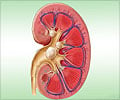A novel genetic target for diuretic therapy has been discovered by University of Cincinnati researchers.

Manoocher Soleimani, MD, professor and chief in the division of nephrology and hypertension, says the role of diuretics is to increase urine output and help patients rid themselves of excess fluid when their kidneys are unable to do so.
"For the last several decades, physicians have been using diuretics either alone or in combination to help patients experiencing water retention," he says, adding that this can occur in patients with heart failure, kidney failure or other serious illnesses. "The most common diuretic used worldwide is hydrochlorothiazide, which works by inhibiting the kidneys' ability to retain water; these drugs can also be used to lower blood pressure. The reason they are so widely used is because they are mild and don't cause severe loss of fluid.
"However, they aren't effective with every patient."
In this study, researchers examined the specific segments of the kidneys, called tubules, and the salt-absorbing genes working there.
"The NaCl, or sodium-chloride, co-transporter (NCC), is targeted by hydrochlorothiazide and drugs in that class; it is located in the close proximity of the chloride-absorbing transporter pendrin, both of which absorb salt in the kidney," Soleimani says. "When pendrin is deleted from the body, there is no effect on salt excretion. We thought that pendrin was present to help NCC function in some way, and by using knockout animal models in this study, we found that these two genes cross-compensate for one another, and if NCC is not working, pendrin kicks in to do its job."
Advertisement
"In addition to experiencing major volume depletion, mice lacking both genes developed kidney failure," Soleimani says. "We were able to show that all of these problems resulted from salt wasting; when we put these models back on high-salt diets, the problems including electrolyte abnormalities and volume depletion were all corrected after just one week."
Advertisement
"By giving a pendrin inhibitor in conjunction with thiazide, a mild diuretic, it could greatly relieve fluid retention, providing another treatment option and improving patient outcomes," he says.
Source-Eurekalert













